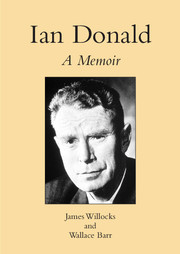Book contents
- Frontmatter
- Contents
- Illustrations
- Acknowledgments
- Miscellaneous Frontmatter
- Preface
- 1 Early life and training
- 2 London 1946—54
- 3 Appointment to the Glasgow Chair
- 4 Glasgow obstetrics in the Fifties
- 4 Sharing Enthusiasm: A textbook – and a teacher – with a difference
- 5 The Western Infirmary Wards G9 and 10
- 6 The cutting edge – in the operating theatre
- 7 The Queen Mother's Hospital
- 8 Science and Serendipity: Ultrasound takes off
- 9 Home life and hobbies
- 10 “Naught for your comfort”: social reform and medical ethics in a changing world
- 11 “At the receiving end”: courage and faith
- 12 “The evening cometh”: international fame, continued battle with illness and home happiness in retirement
- Sources
- Index
- Plate section
11 - “At the receiving end”: courage and faith
Published online by Cambridge University Press: 05 February 2014
- Frontmatter
- Contents
- Illustrations
- Acknowledgments
- Miscellaneous Frontmatter
- Preface
- 1 Early life and training
- 2 London 1946—54
- 3 Appointment to the Glasgow Chair
- 4 Glasgow obstetrics in the Fifties
- 4 Sharing Enthusiasm: A textbook – and a teacher – with a difference
- 5 The Western Infirmary Wards G9 and 10
- 6 The cutting edge – in the operating theatre
- 7 The Queen Mother's Hospital
- 8 Science and Serendipity: Ultrasound takes off
- 9 Home life and hobbies
- 10 “Naught for your comfort”: social reform and medical ethics in a changing world
- 11 “At the receiving end”: courage and faith
- 12 “The evening cometh”: international fame, continued battle with illness and home happiness in retirement
- Sources
- Index
- Plate section
Summary
Courage and faith
For most of his time in Glasgow, Ian Donald was beset with the consequences of heart disease. This was the result of rheumatic fever, which had affected him and his sister Margaret. In 1960, Margaret had a mitral valvotomy performed in Glasgow Royal Infirmary and died as a result. Open-heart surgery was at that time a much more risky affair than it is now. Ian Donald was aware of the risks because, while he worked in Hammersmith Hospital, Ian Aird, the Professor of Surgery, had done much to stimulate research in that field. WP Cleland performed the first operation, reported in the British Medical Journal in 1954 as “Assisted circulation by pump oxygenator during operative dilatation of the aortic valve”. The pump oxygenator was devised by DG Melrose, medical cardiologist. Ian Donald later recorded that he was present in a very minor assisting capacity at this operation in 1953 when cardiopulmonary bypass was first used. Both Cleland and Melrose were his friends for many years and appear again in this chapter.
In the Autumn of 1961, when Ian Donald was in New York, he collapsed with atrial fibrillation. This event was associated with overwork, a typical instance of which was a trip to Stranraer in the extreme southwest of Scotland to demonstrate the vacuum extractor. JW had assisted him in this project and was anxious about the Professor's health as we set off about 5 p.m. to drive south.
- Type
- Chapter
- Information
- Ian DonaldA Memoir, pp. 122 - 134Publisher: Cambridge University PressPrint publication year: 2004

